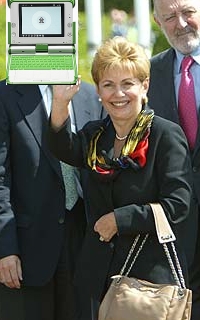I am A. Barrera of Fundación Tecnología para la Gente Panama. I believe that most people, specially socially and economically challenged groups, have the right to have all the things of modern life, beginning with drinking water, basic health care, affordable food and a strong education.
I also believe poor countries must be able to access technology and information, beginning with children, especially in countries with limited natural resources in which technology maybe one answer for economic growth instead of filling the limited space with mining, construction of foreign-owned resorts, land speculation, and rain forest devastation to sell wood and for biodiversity piracy - stealing nature produced biochemicals to patent expensive healing drugs.
OLPC in Panama
When I heard about One Laptop Per Child in a talk given by Nicholas Negroponte in Panama for a meeting of the Media Lab, I was working for Panama's Science and Technology Bureau as director of technology transfer. One of my achievements was to implement community Internet access centers so kids can access computers and Internet almost for free.
I tried then to convince Negroponte of letting Panama to participate and tried to convince my government, such as Ministry of Education, of getting involved under the coordination of the Bureau. Needless to say, it did not happen.

OLPC XO in Panama?
Panama's government changed 4 years ago. The new head of the Bureau introduced changes, and one of them was to explore the introduction of the OLPC but with very limited commitment. At the time of the first meeting Negroponte was asking for a million XOs commitment, and the limited capacity of Panama was not enticing.
Recent announcement of a firm commitment to have OLPC's in Panama by the end of the year, while announcing a visit from a representative of OLPC to Panama, raised suspicions, since the Minister of Education says now it will cost $14 million to implement the OLPC, a hefty tag. Not only that, but an offspring of the Bureau, an agency in charge of government innovation now said that the OLPC for Panama will require changes on its software.
This innovation agency has forced Panama's government in to use Microsoft exclusively for all its operations. They eliminated a non-exclusive agreement the former government signed with Microsoft, agreement I personally drafted. The former government's Bureau always advocated open source, which coincides with the OLPC foundation project, the current one is all Microsoft.
A political impact
The second problem I see is that the current government party is seeking reelection in lest than a year, and projects like OLPC can become a good political ticket support. In third world countries one key strategy to win votes is to show infrastructure stuff and tangible goods, such like dams, roads, bridges, even if they do not improve people's lives. The hurry by Panama's government to have the XOs is clearly looking more and more as a political move to win votes than an educational vision.
Panama's educational system is broke. The current S&T Bureau together with the innovation agency have tried to reform all with computers, for example, by using conceptual mapping software for all schools with no previous scientific research-based to support this, in order to solve the student learning problem, as they said.
The S&T Bureau chief is adviser to the US-based institution in charge of the concept mapping software and scheme, which raised more suspicions. Regardless of these efforts, the students' grade failure instead of diminishing, it keeps climbing to new highs every year. This happens as more foreign knowledge-based labour force is taking over the best paying jobs in Panama.
One day I commented to Negroponte and the OLPC staff via email that the XO, based on the acquisition and implementation scheme he has proposed (essentially a government top-down strategy), could become a political vote-seeking machine in the governmental party arsenal at the time of elections, instead of a long-range educational transformation tool.
That premonition is starting to become a menacing reality in Panama.
Related Links:
.

then the question is... isn't it worth it anyway?
Latin america politics are based on pre-election popular gifts, usually small town elected politicians are the ones who were able to distribute more t-shirts, free food, free dentists, shoes and cheap roads. Most of those have a short life and no long impact on the society.
But if they distibute xos, in a few years he may find out that some fo them are being used to forward emails spreading news about corruption, or using the internet to keep an eye on the senate.
That´s the trojan horse tactic NN always talked about.
A.Barrera,
"I tried then to convince Negroponte of letting Panama to participate and tried to convince my government, such as Ministry of Education, of getting involved under the coordination of the Bureau. Needless to say, it did not happen."
Negroponte was naive, to say the least, expecting countries, especially smaller ones to committing themselves to min 1mln lots. The motivation of various bureaucrats or politicians notwithstanding (nothing new there, whatever the country), there's one fact which seems like a glaring omission (especially surprising since you've supported getting XOs into your country yourself) in your post and what (rather than someone's personal grievances or other's motivation) only, surely, really matters:
50,000 kids in Panama will have access to XOs and once they have them in their hands no politician (or bureaucrat for that matter) will stop them exploring and learning - and that's the very point of OLPC's existence...
A. Barrera, could you provide us with a website for your foundation? I am very interested in learning more about your work with community internet centers. I could not find any information online.
Thanks